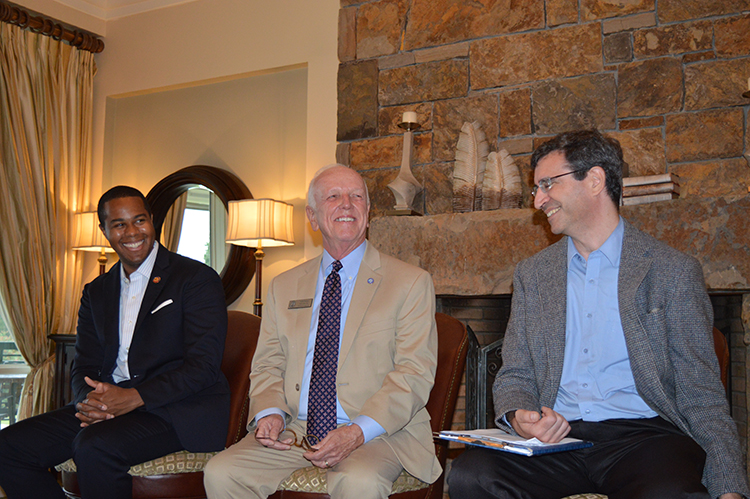
Newsmakers Breakfast: Rep. Beasley, Mayor Pro Tem Washam, Prof. Wertheimer
By Kate Stevens. Continuing to have open dialogues among people with different perspectives on racial issues—and even being uncomfortable during the conversation—are ways to mend our community.
“When it comes to the issues of race, issues of diversity, it’s not comfortable,” said N.C. Rep. Chaz Beasley.
“It requires us to confront a past that many of us are not comfortable with because we realize how many mistakes we’ve made. The only way we’re going to get better is if we not only address it but we critically discuss it and do so in a way that’s constructive.”
Speaking at a Cornelius Today and Business Today Newsmakers Breakfast, Beasley and two other guest speakers, Cornelius Mayor Pro Tem Woody Washam and John Wertheimer, history professor at Davidson College, addressed possible next steps after tragic events in Charlottesville, Va., focused national spotlight one year ago.
Beasley, an African-American Harvard graduate who int on to get a law degree from Georgetown University, compared the issue to a health scare a member of his family recently faced.
“Imagine that we, instead of aggressively addressing that, said let’s ignore it and let’s hope it goes away,” Beasley said.
“None of us would take that approach when it comes to our health. None of us should take that approach when it comes to the health of our country.”
Tensions have been high nationwide after police said white supremacist James Alex Fields, of Ohio, drove into a crowd gathered to protest the “Unite the Right” rally of white nationalists, neo-Nazis and Klu Klux Klan members in Charlottesville on Aug. 12, killing one person and injuring many others.
Fields, 20, has been charged with one count of second degree murder, three counts of malicious wounding and one count of hit-and-run attended failure to stop with injury, according to local police.
The rally was held to protest the planned city-removal of a Confederate Gen. Robert E. Lee statue but white nationalists were met by counter-protesters. The clashes turned violent and then deadly when police said Fields plowed through a crowd.
The issue hits close to home as Cornelius has its own Confederate monument that has been vandalized twice in the past two years. The most recent instance occurred just after the incident in Charlottesville.
The monument sits on private property in front of the Mt. Zion United Methodist Church and is owned by the Mt. Zion Monument Association. Members of the association have not commented.
Meanwhile, Gov. Roy Cooper has sent a formal request to move three Confederate monuments from the State Capitol grounds to a historic site in Johnston County. Republican leaders in Raleigh are opposed.
The Newsmakers discussion at The Peninsula Club was framed in two perspectives: “If it’s hurtful to one, it’s hurtful to all” and “where does it stop?” Attendees included a mix of whites and blacks.
Washam, a lifelong member of Mt. Zion, said the events of Charlottesville were “really eye-opening” for him. He agreed with Beasley that it is time to reach out to each other to encourage discussions that will help improve the quality of life for all residents in Cornelius.
Washam said he believes the group maintaining the monument is preserving it from a historical perspective but personally has come to realize there is more to the monument than history.
“It’s offensive to some people,” said Washam. “I realize that now. I never thought about that, I guess, until it was defaced the first time a couple of years ago.”
The Confederate monument in Cornelius was dedicated in the early 20th century during the time of Jim Crow laws and a new state constitution designed to disenfranchise African-Americans and some poor whites, Wertheimer said.
Judge Armistead Burwell gave an address entitled “The Ideal Confederate Soldier” during the town’s monument dedication in 1910 commemorating the Confederate soldiers who gave their lives defending their homes and families, said Wertheimer.
By force of circumstance, Burwell described these soldiers as defenders of slavery, but not willing advocates, Wertheimer said.
But then Burwell added an element of race to the speech, mentioning purity and protection of the home.
Burwell called on listeners to be reminded of the ideal Confederate soldier and not only be brave when danger appears but “to protect from taint the Saxon blood that courses in your veins,” Wertheimer said.
“It was hard to miss that message,” Wertheimer told the crowd.
Beasley said it was important to share stories detailing the complicated history of how local communities and people today came to be.
Beasley shared a personal story about discovering the father of his great-great-great grandfather was listed as his owner on the “black” man’s death certificate.
Beasley found other records confirming his great-great-great-great-grandfather had white relatives who served in the American Revolutionary War and for the Confederacy in the Civil War but whose line died out soon after the War Between the States.
In other words, the lineage of Beasley, an African-American, didn’t count.
“That’s a story you don’t often hear,” Beasley said. “It’s a story that has been left out of the equation for way too long.”
Beasley said the past comes with a complicated back story.
He’s only just now became comfortable in sharing the story of his ancestor with others.
“Had Charlottesville not happened, I would not have told that story to anybody because it’s really uncomfortable,” Beasley said.
Part of the community’s responsibility is to “be willing to complete the narrative, and a part of that is discussing the monuments and discussing what’s not said…” Beasley said.
Beasley is in favor of letting local governments, not the state, decide which monuments on public property should come down.
The Newsmakers Breakfast was sponsored by Payroll Plus, Davidson Wealth Management, Donna Moffett Accountants and KS Audio Video.




